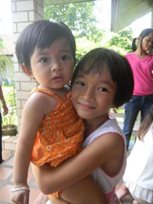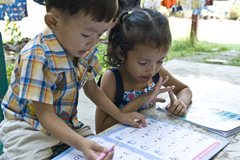SOS-Kinderdörfer


Webseite der SOS-Kinderdörfer in Thailand
Die Deutsch-Thailändische Gesellschaft (DTG) fühlt sich seit vielen Jahren der Arbeit der SOS-Kinderdörfer verbunden. So gibt es in Thailand seit 1988 eine Kooperation mit dem SOS-Kinderdorf Hatyai - ein Kapitel der DTG-Geschichte, auf das man mit Recht stolz sein kann. Es handelt sich um eine Unterstützung, die aus dem Kreis der Mitglieder geleistet wird – zeitweise mit über 30 (dreißig) Spendern, die regelmäßig kleinere und größere Summen geben. Wir bitten Sie, sich an dieser Aktion zu beteiligen! Eine Spende in beliebiger Höhe ist mit keinerlei Mühen verbunden. Die DTG zieht die gewünschte Summe ein, leitet sie weiter nach Thailand und schickt Ende des Jahres eine steuerlich verwendbare Bescheinigung. Und natürlich gibt es bei Bedarf auch immer Informationen darüber, was mit dem Geld in Hatyai geleistet wird. Bitte wenden Sie sich jederzeit an die Geschäftsstelle in Köln.
Arnd Kumerloeve
Deutsch-Thailändische Gesellschaft e.V.,
Verwendungszweck "SOS-Kinderdörfer Thailand"
Geschäftsstelle
Deutsch-Thailändische Gesellschaft e.V
Iddelsfelder Str. 33, D - 51067 Köln
Tel.: +49 (0) 221 - 68 00 210
Fax : +49 (0) 221 - 96 90 287
Email: info@dtg.eu
SOS Children's Villages started working in Thailand in 1971, after Queen Sirikit of Thailand had seen the work of the organisation while on a state visit to Austria. At first the organisation was present in Bangpoo, near the capital city of Bangkok, but has since started providing support in a further four locations in the country.
A changing society

In the past few decades Thailand has undergone a transformation. In the political sphere, the country has seen many changes in government ranging from military rule to elected administrations. In spite of political instability, the economy has improved, and Thailand is one of the most prosperous countries in the region.
Families affected by poverty
Thailand has traditionally been an agricultural economy but, from 1980 onwards governmental policy focused on diversifying the economy. The economy grew by six per cent a year in 2012, and the official unemployment rate stands at around 0,7 per cent (2012 est.). At present, the service sector, employing around 48 per cent plays an important role. Tourism is a vital source of income, with the country's natural beauty attracting millions of visitors a year.
The economic development has led to important changes in Thai society. Many people have moved to urban areas in search of employment - about 34 per cent of the population lives in cities and this number continues to increase. The flourishing economy has also attracted workers from neighbouring, often poorer, countries such as Laos and Cambodia.
In spite of the improved economic conditions, around eight per cent of the population continues to live under the nationally established poverty line. Although, in general terms, there has been a fall in the number of people living in poverty, there are stark differences between provinces; poverty is lowest in Bangkok and the surrounding areas. Some people, especially in rural areas, continue to live in extreme poverty.
Human trafficking remains a significant problem. Although the government passed the Anti-Trafficking in Persons Act in 2008, its implementation remains fragmented. Men, women and children are trafficked into and out of the country, and forced to work in industries such as fishing, construction or agriculture. Many Thai women are trafficked by international criminal gangs to work in the sex industries both at home and abroad.
The exploitation of children remains a problem

Although Thailand has been successful in reducing child labour over the past two decades, the exploitation of children remains a problem. Official figures estimate that eight per cent of children between the ages of five and 14 are involved in work, but the real figure is believed to be higher. The demand for cheap and unskilled labour exists, and children are often forced to work in factories, fisheries, construction and agriculture. Children are also found in the commercial sex industry and to beg on the streets. Many children suffer serious abuse - including physical confinement - at the hands of employers. Migrant children, those in poverty or those who have run away from their families or dropped out of school are most at risk of being involved in the worst forms of labour.
SOS Children's Villages in Thailand

SOS Children's Villages in Thailand

SOS Children's Village Bangpoo, Samutprakarn
Establishment: 1972
Address: 383 Moo 2 Sukhumwit Rd, Tambon Bangpoo-mai, Amphur Muang, Samutprakarn 10280
Children in care: 120

SOS Children's Village Hatyai, Songkla
Establishment: 1988
Address: 1 Tesabal 73 Rd, Tumbol Phatong, Amphur Hatyai, Songkla 90230
Children in care: 120

SOS Children’s Village Nongkhai
Establishment: 1992
Address: 185 Moo3, Mitraparb Rd, Tambon Poh-chai, Amphur Muang, Nongkhai 43000
Children in care: 120

SOS Children's Village Chiang Rai
Establishment: 2005
Address: 236 Moo 5 Paholyothin Rd, Tambon Ta-sud, Amphur Muang, Chiang Rai 57100
Children in care: 140

SOS Children's Village Phuket
Establishment: 2008
Address: 90 Moo2 Tumbol Koh-Keaw, Amphur Muang, Phuket 83200
Children in care: 120



















.jpg)















